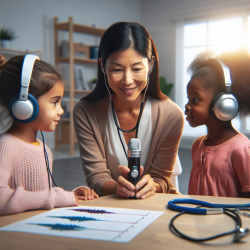Speech assessment for multilingual children presents unique challenges, particularly when the child speaks languages not shared by the speech-language pathologist (SLP). Drawing from the research article "Tutorial: Speech Assessment for Multilingual Children Who Do Not Speak the Same Language(s) as the Speech-Language Pathologist," this blog provides data-driven strategies to improve SLP practices and outcomes for multilingual children.
Key Findings from the Research
The research emphasizes the importance of a comprehensive, culturally sensitive approach to assessing multilingual children. Key recommendations include:
- Thorough Case History: Collect detailed information about the child's language exposure, usage patterns, and cultural context. Tools like the Alberta Language and Development Questionnaire can be invaluable.
- Assessment in All Languages: Evaluate speech production in all the child's languages to get a complete picture of their abilities. Use both formal and informal measures.
- Cross-Linguistic Transfer: Be aware of how skills and errors in one language can affect the other. This is crucial for accurate diagnosis and goal setting.
- Dynamic Assessment: Use dynamic assessment techniques to gauge the child's learning potential and responsiveness to intervention.
- Cultural Competence: Reflect on your own cultural biases and work to understand the child's cultural background. Engage with the child's community and use interpreters when necessary.
Implementing These Findings
To apply these recommendations in your practice, consider the following steps:
- Expand Your Knowledge Base: Familiarize yourself with the phonetic and phonological characteristics of the languages spoken by the children you assess. Resources like the Speech Accent Archive and the Multilingual Children's Speech website can be helpful.
- Use Technology: Employ high-quality audio and video recording equipment to capture speech samples. Software like Praat can assist in detailed acoustic analysis.
- Collaborate with Interpreters: Train interpreters to assist in the assessment process, ensuring they understand the goals and procedures involved.
- Engage Families: Involve parents and caregivers in the assessment process. Their insights can provide valuable context and enhance the accuracy of your findings.
Encouraging Further Research
While this tutorial provides a robust framework, the field of multilingual speech assessment is continually evolving. SLPs are encouraged to stay updated with the latest research and to contribute to the body of knowledge through their own practice-based research.
To read the original research paper, please follow this link: Tutorial: Speech Assessment for Multilingual Children Who Do Not Speak the Same Language(s) as the Speech-Language Pathologist.










